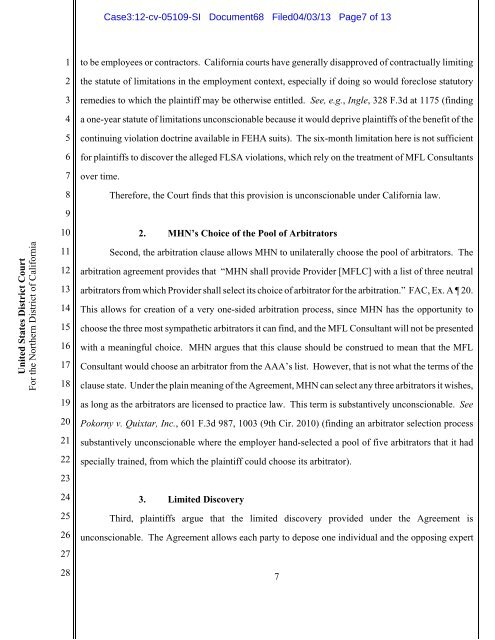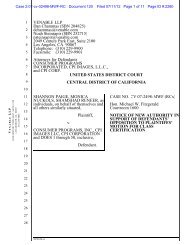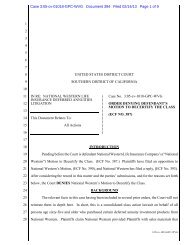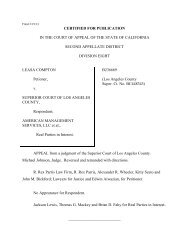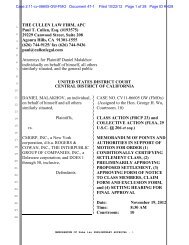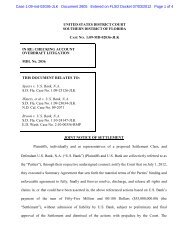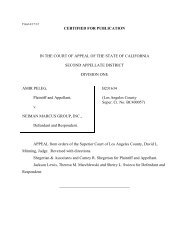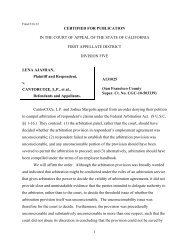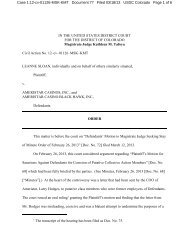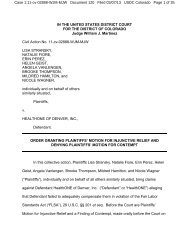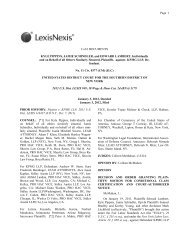order denying motion to compel arbitration - Impact Litigation Journal
order denying motion to compel arbitration - Impact Litigation Journal
order denying motion to compel arbitration - Impact Litigation Journal
You also want an ePaper? Increase the reach of your titles
YUMPU automatically turns print PDFs into web optimized ePapers that Google loves.
Case3:12-cv-05109-SI Document68 Filed04/03/13 Page7 of 13<br />
1<br />
2<br />
3<br />
4<br />
5<br />
6<br />
7<br />
8<br />
9<br />
<strong>to</strong> be employees or contrac<strong>to</strong>rs. California courts have generally disapproved of contractually limiting<br />
the statute of limitations in the employment context, especially if doing so would foreclose statu<strong>to</strong>ry<br />
remedies <strong>to</strong> which the plaintiff may be otherwise entitled. See, e.g., Ingle, 328 F.3d at 1175 (finding<br />
a one-year statute of limitations unconscionable because it would deprive plaintiffs of the benefit of the<br />
continuing violation doctrine available in FEHA suits). The six-month limitation here is not sufficient<br />
for plaintiffs <strong>to</strong> discover the alleged FLSA violations, which rely on the treatment of MFL Consultants<br />
over time.<br />
Therefore, the Court finds that this provision is unconscionable under California law.<br />
United States District Court<br />
For the Northern District of California<br />
10<br />
11<br />
12<br />
13<br />
14<br />
15<br />
16<br />
17<br />
18<br />
19<br />
20<br />
21<br />
22<br />
23<br />
2. MHN’s Choice of the Pool of Arbitra<strong>to</strong>rs<br />
Second, the <strong>arbitration</strong> clause allows MHN <strong>to</strong> unilaterally choose the pool of arbitra<strong>to</strong>rs. The<br />
<strong>arbitration</strong> agreement provides that “MHN shall provide Provider [MFLC] with a list of three neutral<br />
arbitra<strong>to</strong>rs from which Provider shall select its choice of arbitra<strong>to</strong>r for the <strong>arbitration</strong>.” FAC, Ex. A 20.<br />
This allows for creation of a very one-sided <strong>arbitration</strong> process, since MHN has the opportunity <strong>to</strong><br />
choose the three most sympathetic arbitra<strong>to</strong>rs it can find, and the MFL Consultant will not be presented<br />
with a meaningful choice. MHN argues that this clause should be construed <strong>to</strong> mean that the MFL<br />
Consultant would choose an arbitra<strong>to</strong>r from the AAA’s list. However, that is not what the terms of the<br />
clause state. Under the plain meaning of the Agreement, MHN can select any three arbitra<strong>to</strong>rs it wishes,<br />
as long as the arbitra<strong>to</strong>rs are licensed <strong>to</strong> practice law. This term is substantively unconscionable. See<br />
Pokorny v. Quixtar, Inc., 601 F.3d 987, 1003 (9th Cir. 2010) (finding an arbitra<strong>to</strong>r selection process<br />
substantively unconscionable where the employer hand-selected a pool of five arbitra<strong>to</strong>rs that it had<br />
specially trained, from which the plaintiff could choose its arbitra<strong>to</strong>r).<br />
24<br />
25<br />
26<br />
27<br />
3. Limited Discovery<br />
Third, plaintiffs argue that the limited discovery provided under the Agreement is<br />
unconscionable. The Agreement allows each party <strong>to</strong> depose one individual and the opposing expert<br />
28 7


